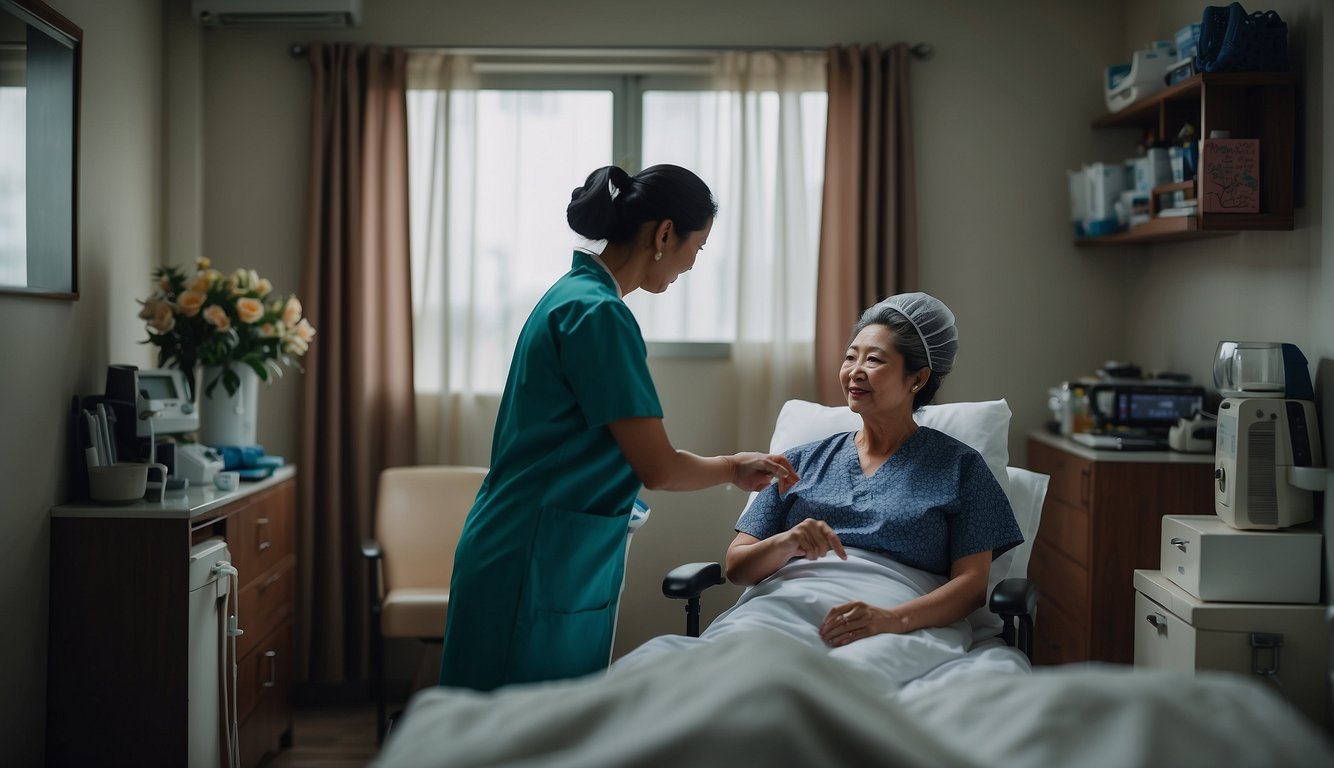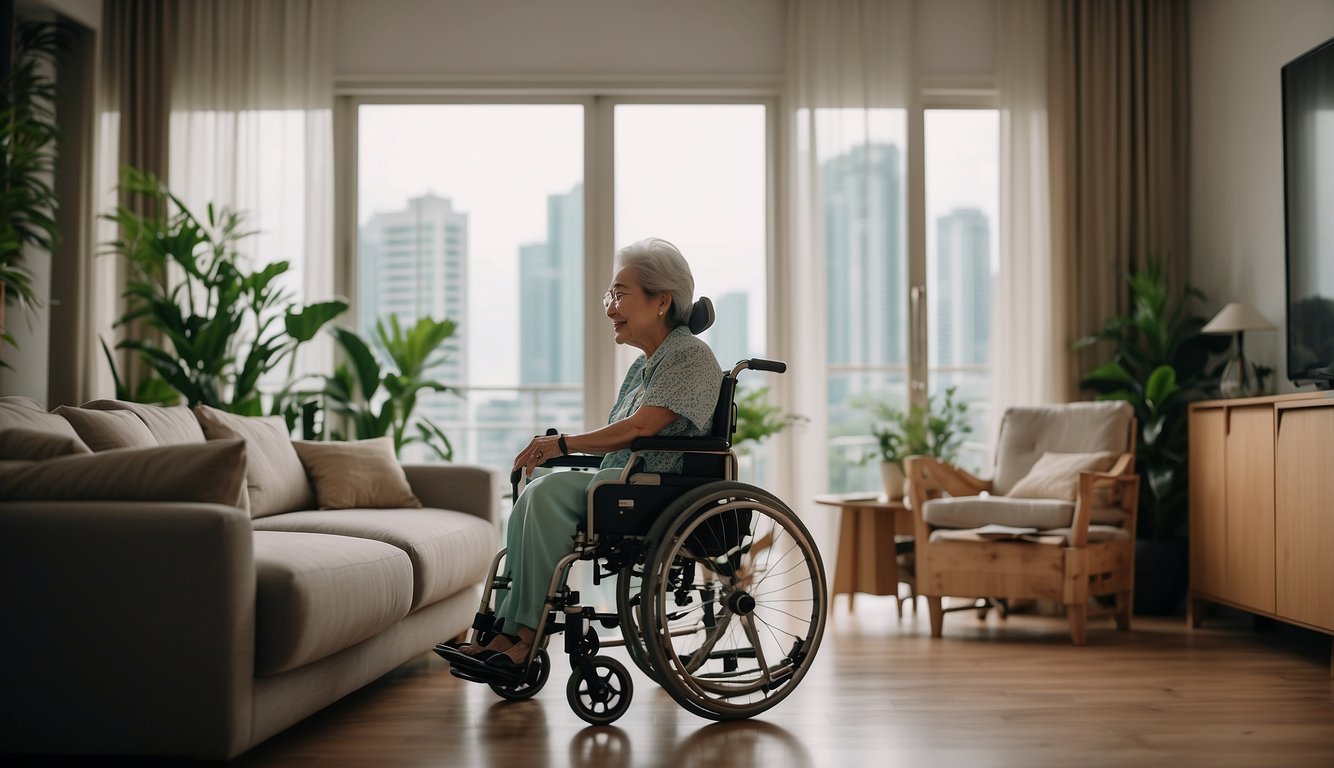Home Medical Services Singapore
If you or a loved one are in need of medical care but prefer the comfort of your own home, you’re in luck. Singapore offers a range of comprehensive home care services that can help improve your quality of life. Home medical services in Singapore are designed to provide patients with the medical attention they need without the hassle of traveling to a hospital or clinic.

Whether you require nursing, physical therapy, occupational therapy, or basic personal care, home care services in Singapore can provide you with the care you need to continue living at home. These services are especially beneficial for elderly, disabled, or ill individuals who have difficulty commuting or require long-term care. With home medical services in Singapore, you can enjoy a seamless home care experience that is tailored to your unique needs.
Key Takeaways
- Comprehensive home care services in Singapore provide patients with the medical attention they need in the comfort of their own home.
- Home care services can help improve the quality of life for elderly, disabled, or ill individuals who have difficulty commuting or require long-term care.
- With home medical services in Singapore, you can enjoy a seamless home care experience that is tailored to your unique needs.
Comprehensive Home Care Services in Singapore

If you or your loved one needs medical attention and care but prefers to stay at home, you can take advantage of the comprehensive home care services available in Singapore.
Understanding Home Medical and Nursing Care
Home medical services are provided by licensed doctors who can visit you at home to provide medical attention, review your medications, and offer medical advice. Nursing care services, on the other hand, are provided by qualified nurses who can assist with daily living activities, such as showering, dressing, and medication administration.
Eligibility and Application for Home Care
Permanent residents of Singapore who require home medical or nursing care can apply for these services through the Agency for Integrated Care (AIC). The AIC will assess your eligibility for home care services based on your medical condition and level of disability.
To apply for home care services, you can contact the AIC or visit their website for more information. You may also need to undergo a disability assessment and means testing to determine the level of subsidy you are eligible for.
Financial Assistance and Subsidies
The cost of home care services can vary depending on the level of care required and the subsidies available. Fortunately, there are government subsidies available to help offset the costs of home care services.
The National Means Testing System (NMTS) is used to determine the level of subsidy you are eligible for based on your income and means. You may also be eligible for a means-testing subsidy, which can cover up to 80% of the cost of home care services.
If you are caring for a loved one at home, you may also be eligible for the Home Caregiving Grant, which provides financial assistance for caregiving expenses.
Home Therapy and Care Plan
In addition to home medical and nursing care, home therapy services are also available in Singapore. These services are provided by qualified therapists who can assist with physical therapy, occupational therapy, and speech therapy.
To ensure that you or your loved one receives the appropriate level of care, a care plan will be developed by a medical social worker. This plan will outline the specific services required and the frequency of visits.
Homage and Free Consultation
If you are interested in home care services but are unsure where to start, Homage offers a free consultation to help you understand your options. Their care professionals can assist with everything from medication delivery to medical escort services.
With comprehensive home care services available in Singapore, you can rest assured that you or your loved one will receive the medical attention and care needed to stay healthy and comfortable at home.
Seamless Home Care Experience

If you have a loved one who requires medical attention but prefers to stay at home, you can integrate home medical services with daily life. With the help of a registered nurse or doctor, you can manage your loved one’s medical needs while still carrying on with your daily routine. Home care services can be tailored to your loved one’s specific needs, and you can review and refer to the care plan with the nurse or doctor during visits.
As a caregiver, you may need support and resources to ensure that your loved one receives the best possible care. The Agency for Integrated Care (AIC) provides support for caregivers through their website, social workers, and care advisors. You can enrol your loved one in home medical services through AIC’s website, and a care advisor will get in touch with you to discuss the next steps. AIC’s website also provides resources on functional skills, such as feeding, wound dressing, and urinary catheter care, to help you manage your loved one’s medical condition.
Choosing the right home care provider is important to ensure that your loved one receives the best possible care. You can book home medical services with Homage, an active and responsive app that allows customers to book house calls, review reports, and chat with the support team. Homage also provides night care and companionship services, which can help your loved one with activities such as showering and feeding. You can also choose to engage NTUC Health Elderly Care, which provides 24-hour hotline support and has hospitals and polyclinics across Singapore.
In summary, integrating home medical services with daily life can provide a seamless and personalised care experience for your loved one. With the right support and resources, you can manage your loved one’s medical needs while still carrying on with your daily routine. Choosing the right home care provider is important to ensure that your loved one receives the best possible care.
Frequently Asked Questions

How can I arrange for a doctor to make a house call for an elderly family member?
If you need a doctor to make a house call for an elderly family member, you can contact a home medical service provider such as Home Instead or NTUC Health. These providers offer home medical services, including house calls from doctors, to elderly patients who are unable to travel to a clinic or hospital.
What are the top-rated home medical service providers for urgent care in Singapore?
Some of the top-rated home medical service providers for urgent care in Singapore include Speedoc, Doctor Anywhere, and WhiteCoat. These providers offer on-demand medical services, including home visits, to patients who require urgent medical attention.
What steps should I take to secure home care services through the AIC in Singapore?
If you are looking to secure home care services through the Agency for Integrated Care (AIC) in Singapore, you can start by visiting their website at www.aic.sg. From there, you can learn more about the different types of home care services available, such as home nursing, home therapy, and home personal care. You can also find a list of approved home care service providers in Singapore.
How much would I expect to pay for a private nurse to provide home care?
The cost of hiring a private nurse to provide home care in Singapore can vary depending on a number of factors, such as the level of care required, the duration of care needed, and the qualifications and experience of the nurse. According to NTUC Health, the cost of home nursing services can range from $4.20 to $141 per visit, while the cost of home personal care services can range from $2.70 to $26 per hour.
Can you explain the Hospital to Home (H2H) Programme and how one can benefit from it?
The Hospital to Home (H2H) Programme is a nationwide programme in Singapore that supports patients’ safe and timely transit back home, so that they can stay well and age gracefully in the community. It is targeted at patients with complex health and social needs, and a high risk of readmissions. To benefit from the H2H Programme, patients can speak to their healthcare provider or contact the AIC for more information.
What’s the key distinction between receiving care in a community hospital and a nursing home?
The key distinction between receiving care in a community hospital and a nursing home is that community hospitals are designed to provide short-term care and rehabilitation services to patients who require medical attention but do not need to be admitted to a traditional hospital. Nursing homes, on the other hand, are designed to provide long-term care and support to elderly patients who are unable to live independently and require round-the-clock medical attention.




